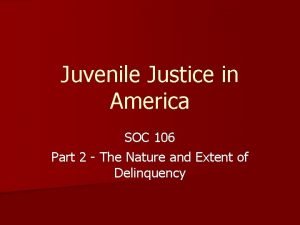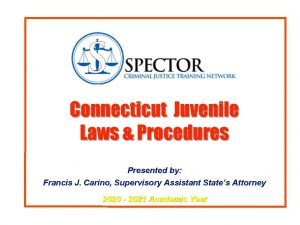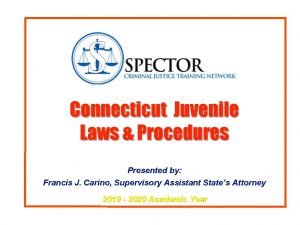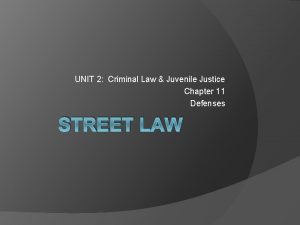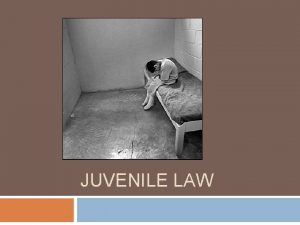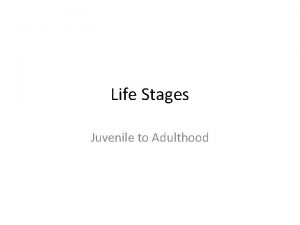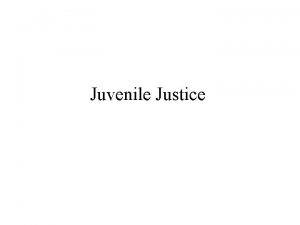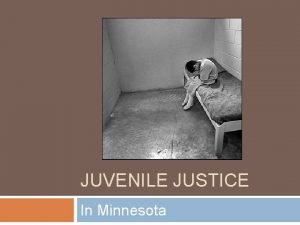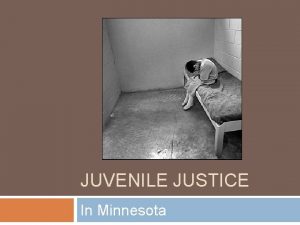JUVENILE LAW History of Juvenile Law Originally juvenile










- Slides: 10

JUVENILE LAW

History of Juvenile Law Originally, juvenile offenders were treated the same as adult criminals Beginning in 1899, states began forming separate juvenile courts States took responsibility for parenting the children until they showed signs of positive change Why do you think states made this change?

Rights of Juveniles and In Re Gault The 5 th Amendment of the Constitution states that "No person shall be held to answer for a capital, or otherwise infamous crime, unless on a presentment or indictment of a Grand Jury…nor shall [a person] be compelled in any criminal case to be a witness against himself, nor be deprived of life, liberty, or property, without due process of the law. "

What is Due Process Fair treatment through the normal judicial system, especially as a citizen's entitlement.

Rights of Juveniles and In Re Gault The 14 th Amendment of the Constitution states that "No State shall make or enforce any law which shall abridge the privileges or immunities of citizens of the United States; nor shall any State deprive any person of life, liberty, or property, without due process of law; nor deny to any person within its jurisdiction the equal protection of the laws. "

Rights of Juveniles and In Re Gault Who: Gerald Gault, age 15 What: (1967) � Accused of making an obscene phone call to his neighbor. � Gault said that his friend made the phone call. � Police placed Gault in detention without informing his parents. � One week later a judge sentenced Gault to the State Industrial School until Gault turned 21 years old. � No witnesses or jury were present at the trial.

Rights of Juveniles and In Re Gault Supreme Court Decision: � Juvenile Courts must respect the Due Process rights of juveniles during their proceedings. � Youth have the following rights under the law: The right to receive notice of charges The right to obtain legal counsel The right to "confrontation and cross-examination" The "privilege against self-incrimination“ (exposing yourself) The right to receive a "transcript of the proceedings, " and The right to "appellate review" (petition)

What is the Purpose of Criminal Law? Punishment � � Prevention � � Discourage offender from committing crimes in the future Discourage future offenders Incapacitation � � “Eye for an Eye” Way for society to take revenge Lock up in jail Protect society from offender Rehabilitation � � Focus on changing behavior to lead a productive life Examples: vocational programs, counseling What do you think is the goal of juvenile justice?

Key Terminology Criminal System Juvenile System Defendant Respondent Trial by jury Adjudication, not all states give juveniles the right to a jury trial Sentencing Disposition Crime Offense Criminal Juvenile Offender Guilty Delinquent Sentenced based upon offense Sentencing varies, many options

Activity 4 Cases, 4 Crimes, You Be the Judge
 Sexting laws in ct
Sexting laws in ct Juvenile law definition
Juvenile law definition Francarino
Francarino Fran carino juvenile law
Fran carino juvenile law Unit 2 criminal law and juvenile justice
Unit 2 criminal law and juvenile justice What was the game of volleyball originally called
What was the game of volleyball originally called Unix was originally developed in
Unix was originally developed in Evidence best indicates that rock layers 4 and 8
Evidence best indicates that rock layers 4 and 8 Originally carol ann duffy annotated
Originally carol ann duffy annotated Autobiographical poem
Autobiographical poem Playdoh when was it invented
Playdoh when was it invented

